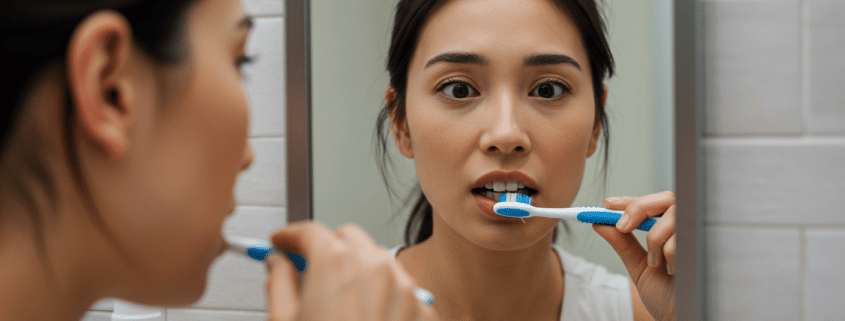How Your Daily Habits Are Impacting Your Teeth More Than You Realize
We all know that brushing and flossing are essential for a healthy smile, but did you know that some of your everyday habits could be secretly damaging your teeth? From the way you sip your morning coffee to how you handle stress, small routines can have a big impact on your oral health—for better or worse.
In this blog, we’ll uncover surprising ways your daily habits are impacting your teeth, how they can lead to problems like cavities, enamel erosion, and gum disease, and what you can do to protect your smile.
If you’re wondering why you still get cavities despite good oral hygiene, or why your teeth feel sensitive out of nowhere, your daily habits may be the culprit!
TLDR – Quick Guide
- Diet and drinking habits – Acidic and sugary drinks weaken enamel, leading to decay.
- Nail-biting, grinding, and chewing ice – These habits can cause chipped teeth and jaw issues.
- Brushing mistakes – Overbrushing and using the wrong technique can damage gums and enamel.
- Skipping water and mouthwash – Dehydration leads to dry mouth, increasing the risk of cavities.
- Stress and oral health – Stress can cause teeth grinding, gum disease, and mouth ulcers.
1. Your Diet & Drinking Habits Matter More Than You Think
What you eat and drink every day plays a huge role in your dental health.
🚨 Biggest offenders:
- Sugary drinks (soda, fruit juice, energy drinks) – Bacteria in your mouth thrive on sugar, leading to cavities and decay.
- Acidic beverages (coffee, tea, wine, citrus juices) – Can erode enamel over time, making teeth sensitive.
- Frequent snacking – Constant snacking means your teeth are exposed to acids longer, increasing the risk of cavities.
💡 Better choices: Drink water throughout the day, use a straw for acidic drinks, and rinse your mouth after consuming sugar.
2. Nail-Biting, Teeth Grinding, and Chewing Ice – Bad News for Your Teeth
🚨 Why these habits are harmful:
- Nail-biting – Can chip or crack teeth and introduce bacteria into your mouth.
- Teeth grinding (bruxism) – Wears down enamel, causes jaw pain and headaches, and can lead to TMJ disorders.
- Chewing ice – The hardness of ice can crack or break teeth, leading to expensive repairs.
💡 Solutions: Try stress-reducing techniques, wear a mouthguard if you grind your teeth, and chew sugar-free gum instead of biting nails.
3. Brushing Mistakes That Could Be Hurting Your Teeth
Even if you brush daily, doing it incorrectly can cause more harm than good.
🚨 Common brushing mistakes:
- Brushing too hard – Can wear down enamel and irritate gums, leading to recession.
- Using the wrong toothbrush – Hard-bristled brushes can cause damage; soft bristles are best.
- Skipping nighttime brushing – At night, saliva production slows down, making teeth more vulnerable to bacteria.
💡 Pro tip: Use a soft-bristled toothbrush, brush twice a day for two minutes, and replace your toothbrush every 3-4 months.
4. Not Drinking Enough Water Leads to Dry Mouth & Decay
Saliva is your natural defense against cavities, washing away food particles and neutralizing acids. If you’re not drinking enough water, you may experience dry mouth (xerostomia), which increases your risk of:
- Cavities and gum disease
- Bad breath
- Tooth sensitivity
💡 Fix it: Drink plenty of fluoridated water, chew sugar-free gum to stimulate saliva, and avoid excessive caffeine or alcohol, which dry out your mouth.
5. Stress Can Wreak Havoc on Your Oral Health
Stress doesn’t just affect your mental health—it can also take a serious toll on your teeth.
🚨 Common stress-related dental issues:
- Bruxism (teeth grinding) – Often happens unconsciously, especially at night.
- Gum disease – Chronic stress weakens the immune system, making gums more vulnerable to infection.
- Mouth ulcers & canker sores – Stress can trigger painful sores in the mouth.
💡 What to do: Practice stress management techniques like meditation, yoga, or deep breathing. If you grind your teeth, ask your dentist about a nightguard.
Key Takeaways
✔ Your daily habits have a direct impact on your teeth—for better or worse.
✔ Sugary and acidic drinks weaken enamel, increasing the risk of decay.
✔ Bad habits like nail-biting, teeth grinding, and chewing ice can damage teeth.
✔ Brushing mistakes, skipping water, and high stress levels all contribute to oral health problems.
✔ Making small changes in your daily routine can significantly improve your dental health.
💡 Final Thought: A healthy smile starts with daily habits. Want to improve your oral health? Start by making one small change today!
FAQs About How Daily Habits Impact Your Teeth
1. How bad is it to sip on coffee or soda throughout the day?
Very bad! Sipping continuously keeps your teeth bathed in acid, weakening enamel. If you must drink these beverages, use a straw and rinse with water afterward.
2. Can stress really cause tooth problems?
Yes! Stress increases the risk of teeth grinding, gum disease, and mouth sores. Managing stress can improve both your mental and oral health.
3. What’s the worst habit for your teeth?
Besides poor brushing, teeth grinding and frequent sugar consumption are among the worst offenders. Both can cause severe damage over time.
4. How do I stop nail-biting and teeth grinding?
Try stress-reducing activities, use bitter-tasting nail polish to discourage nail-biting, and ask your dentist about a nightguard if you grind your teeth.
5. Is mouthwash necessary for good oral health?
While not a substitute for brushing and flossing, fluoride or antibacterial mouthwash can help reduce plaque and prevent cavities. Avoid alcohol-based rinses if you have dry mouth.




Leave a Reply
Want to join the discussion?Feel free to contribute!